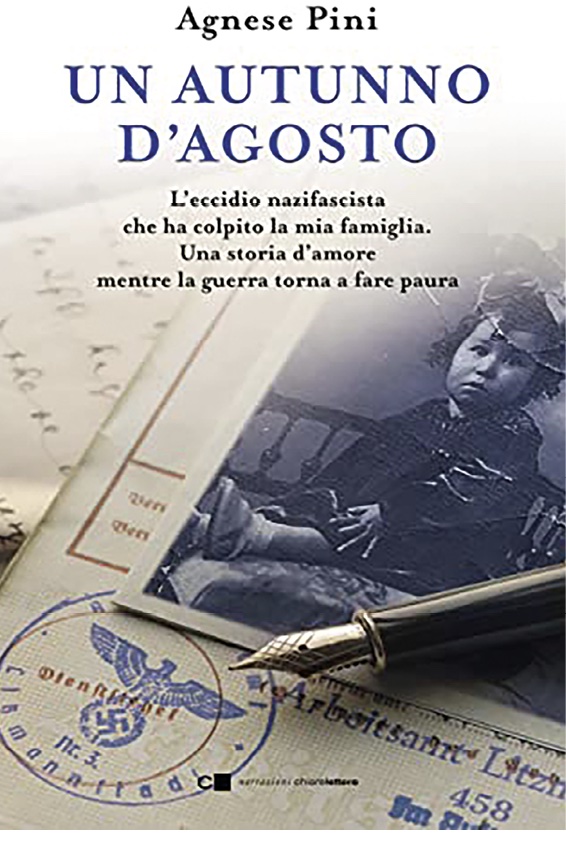Agnese Pini, the first female editor-in-chief of the newspaper “La Nazione” and of the newspapers “Il Resto del Carlino” and “Il Giorno,” is not just a great journalist. She is also a sensitive and empathetic writer whose book “Un autunno d’agosto” (An August Autumn) resurrects a forgotten event of the Second World War: a ferocious nazi-fascist massacre that also struck her family in San Terenzo Monti, a small town in the Lunigiana territory. The book is full of emotion, and will remain in the heart of its readers because certain memories can never be forgotten. Agnese Pini decided to write the truth to render justice to the victims. Justice and truth, words that are too often meaningless in Italy, but that in her story resound forcefully page after page.
“Un autunno d’agosto” is a poetic, alienating, intriguing title. How did you choose it?
I found it inscribed on a small marble brick used to build the chapel where the victims of the massacre are buried. It’s an anonymous inscription, I don’t know who wrote it. When I went to visit the cemetery, I glanced at that small brick and the inscription, and thought “This is the book’s title.” I decided spontaneously, it was so evocative. I’d love to track down the author, but no one in the town knows who it is.

Your family’s story intertwines with Italy’s. Can creating a collective memory make us more aware of present-day issues such as violence, injustice, and discrimination?
I think that grief can be given dignity only if it is shared and becomes collective. The most frequent and most dangerous thing is to remain silent when you suffer trauma, feel pain, because you’re ashamed of it, you don’t talk about it because you feel guilty. It’s a characteristic trait of victims. But when grief becomes collective, when it’s shared, when many people acknowledge that same grief, it’s easier to deal with. The nazi-fascist massacres committed in Italy during the Second World War (just like all war crimes that are unfortunately repeated identically in every era and in every location) always pertain to collective grief, because those massacres destroyed entire communities. In the San Terenzo Monti massacre, like the ones in Marzabotto, Sant’Anna, My Lai in Vietnam, Bucha in Ukraine, or in the Hamas attack on 7 October 2023, entire communities are wiped out, and one lifetime isn’t enough for moral rebuilding. Generations are needed to re-sew the fabric that was ripped apart, and this is often very hard to do because the victims don’t talk. The attempt to write a book that described not only my family’s story (and therefore private grief), but the public grief of the entire community, which symbolically represents countless communities that have been overwhelmed by these horrendous crimes, was essential in order to portray the collective, and therefore curative, dimension of grief.
Recounting reality is a way to render justice and seek the truth?

It was that, too, because the nazi-fascist massacres in Italy have a common denominator: denied justice. There were sixty thousand victims of war crimes in Italy from 1943 to 1945, and for many reasons the great majority of them had no trials, no justice, no convictions. For reasons of state, because, because it was inappropriate to annoy the new ally, West Germany, which had to re-enter a large western coalition, with the world divided into the Eastern and Western blocks. Moreover, Italians had committed horrible war crimes in Greece, Albania, and northern Africa, and there was fear that someone in these countries might likewise demand justice for their victims. The trials were held only very recently, and therefore were inevitably only partial because most of the executioners and victims were no longer alive. The idea of historically and legally reconstructing the events of that specific massacre was extraordinarily important because legal truths – and I say this as a journalist – have enormous value. They always become historical truths. The trial and the court records become incontestable and help reconstruct a historical truth not contaminated by doubts or prejudice, a truth that can’t be manipulated or falsified. We still don’t have a collective memory regarding these massacres, thus acquitting the Italians, who instead were always there. There were the repubblichini, fascist collaborators who aided the nazis in committing those horrors. And if now we have only family memories and not a collective National memory it’s precisely because we lack the objective legal truths that can then become historical truths. This is why it’s important to analytically reconstruct what happened, and there’s always time to do this. One of the very few examples of a trial held shortly after the Second World War regarded the massacre in Vinca, a small town very near San Terenzo Monti, where a few days after the San Terenzo massacre another horrendous slaughter was carried out by the same group of nazis led by Major Walter Reder. In 1949, a very rare trial was held in Perugia, at which thirteen Italian repubblichini of the Xª MAS were sentenced to life imprisonment for their atrocious crimes, crimes against the people of Vinca that are hard to describe because of their unimaginable vileness. At that trial, the presence of Italians isn’t entrusted to memory, but is written in black and white, and no one can doubt it.
You chose an investigative style of writing, linked to real events. Wouldn’t you like to write something that springs from your imagination?
Frankly, that’s not my craft, but I did have to use my imagination for my book because it’s not just a historical investigation, it’s also a novel to the extent that characters of the past are brought back to life. I make them speak, act, think, and of course I entrusted this part to my imagination. I tried to respect historical truth as much as possible, knowing that some artistic license it taken when people are transformed into characters, and you risk not being entirely faithful to the truth. Going beyond the essay and giving emotion to the characters helped fully restore the humanity that was stolen by the massacre and by the legal and historical denial of this tragedy.
Goodness seems to be out of fashion. Good guys are seen as losers, as weak. The weakest always get bullied. Is there a way to reverse this paradigm?
By remembering history, by remembering what we accomplished when we made goodness prevail. I think of the current disaster in the Middle East. I listened to a wonderful interview of Yuval Harari, a progressive Israeli philosopher, and among the many beautiful things he said was “throughout history, yesterday’s wounds justify today’s wounds,” and so there’s never any way out. The weakest is overpowered based on a justification that derives from the past. After the Second World War, after unimaginable horrors, we Italians and Europeans have managed not only to build peace, but to build the European Union. We are twinned with the German cities that had destroyed us, and this means that an idea of goodness can prevail when past wounds are no longer used to justify those of the present. This is extremely rare, perhaps it was the first time ever, and it shows that humans are capable of horrors but also of having reason and goodness prevail. We must never forget this, never take it for granted, because it shows us that it’s possible.
What do writing and literature mean to you? What is the power of the word?
It’s extraordinary, a power of pure creation. Words create worlds when we use them and receive them. They create things because things exist the instant we name them. Always. In the Bible, the first thing Adam and Eve do is give a name to plants, to animals, and make them exist. But because words have this power, they are also dangerous: used badly, they can become destructive. In literature, words are generally used to create worlds that give us meaning or that restore truth and dignity to things that lacked them. Personal, private stories, but also collective stories, like the one I chose to tell. It’s exhilarating to work with such powerful material, with words that create worlds and realities, not just feelings and images.
And your next book?
Writing this one was very rewarding, and I hope I’ll find the strength again. Writing is very demanding: when I finished this book I thought, “I can’t believe I did it.” I hope to have that capacity once again.




.png)